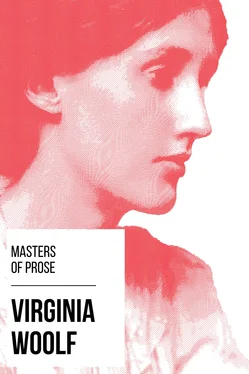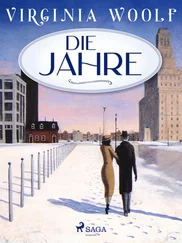And it was at this moment, when she had ceased to call 'Orlando' and was deep in thoughts of something else, that the Orlando whom she had called came of its own accord; as was proved by the change that now came over her (she had passed through the lodge gates and was entering the park).
The whole of her darkened and settled, as when some foil whose addition makes the round and solidity of a surface is added to it, and the shallow becomes deep and the near distant; and all is contained as water is contained by the sides of a well. So she was now darkened, stilled, and become, with the addition of this Orlando, what is called, rightly or wrongly, a single self, a real self. And she fell silent. For it is probable that when people talk aloud, the selves (of which there may be more than two thousand) are conscious of disseverment, and are trying to communicate, but when communication is established they fall silent.
Masterfully, swiftly, she drove up the curving drive between the elms and oaks through the falling turf of the park whose fall was so gentle that had it been water it would have spread the beach with a smooth green tide. Planted here and in solemn groups were beech trees and oak trees. The deer stepped among them, one white as snow, another with its head on one side, for some wire netting had caught in its horns. All this, the trees, deer, and turf, she observed with the greatest satisfaction as if her mind had become a fluid that flowed round things and enclosed them completely. Next minute she drew up in the courtyard where, for so many hundred years she had come, on horseback or in coach and six, with men riding before or coming after; where plumes had tossed, torches flashed, and the same flowering trees that let their leaves drop now had shaken their blossoms. Now she was alone. The autumn leaves were falling. The porter opened the great gates. 'Morning, James,' she said, 'there're some things in the car. Will you bring 'em in?' words of no beauty, interest, or significance themselves, it will be conceded, but now so plumped out with meaning that they fell like ripe nuts from a tree, and proved that when the shrivelled skin of the ordinary is stuffed out with meaning it satisfies the senses amazingly. This was true indeed of every movement and action now, usual though they were; so that to see Orlando change her skirt for a pair of whipcord breeches and leather jacket, which she did in less than three minutes, was to be ravished with the beauty of movement as if Madame Lopokova were using her highest art. Then she strode into the dining-room where her old friends Dryden, Pope, Swift, Addison regarded her demurely at first as who should say Here's the prize winner! but when they reflected that two hundred guineas was in question, they nodded their heads approvingly. Two hundred guineas, they seemed to say; two hundred guineas are not to be sniffed at. She cut herself a slice of bread and ham, clapped the two together and began to eat, striding up and down the room, thus shedding her company habits in a second, without thinking. After five or six such turns, she tossed off a glass of red Spanish wine, and, filling another which she carried in her hand, strode down the long corridor and through a dozen drawing-rooms and so began a perambulation of the house, attended by such elk-hounds and spaniels as chose to follow her.
This, too, was all in the day's routine. As soon would she come home and leave her own grandmother without a kiss as come back and leave the house unvisited. She fancied that the rooms brightened as she came in; stirred, opened their eyes as if they had been dozing in her absence. She fancied, too, that, hundreds and thousands of times as she had seen them, they never looked the same twice, as if so long a life as theirs had stored in them a myriad moods which changed with winter and summer, bright weather and dark, and her own fortunes and the people's characters who visited them. Polite, they always were to strangers, but a little weary: with her, they were entirely open and at their ease. Why not indeed? They had known each other for close on four centuries now. They had nothing to conceal. She knew their sorrows and joys. She knew what age each part of them was and its little secrets--a hidden drawer, a concealed cupboard, or some deficiency perhaps, such as a part made up, or added later. They, too, knew her in all her moods and changes. She had hidden nothing from them; had come to them as boy and woman, crying and dancing, brooding and gay. In this window-seat, she had written her first verses; in that chapel, she had been married. And she would be buried here, she reflected, kneeling on the window-sill in the long gallery and sipping her Spanish wine. Though she could hardly fancy it, the body of the heraldic leopard would be making yellow pools on the floor the day they lowered her to lie among her ancestors. She, who believed in no immortality, could not help feeling that her soul would come and go forever with the reds on the panels and the greens on the sofa. For the room--she had strolled into the Ambassador's bedroom--shone like a shell that has lain at the bottom of the sea for centuries and has been crusted over and painted a million tints by the water; it was rose and yellow, green and sand-coloured. It was frail as a shell, as iridescent and as empty. No Ambassador would ever sleep there again. Ah, but she knew where the heart of the house still beat. Gently opening a door, she stood on the threshold so that (as she fancied) the room could not see her and watched the tapestry rising and falling on the eternal faint breeze which never failed to move it. Still the hunter rode; still Daphne flew. The heart still beat, she thought, however faintly, however far withdrawn; the frail indomitable heart of the immense building.
Now, calling her troop of dogs to her she passed down the gallery whose floor was laid with whole oak trees sawn across. Rows of chairs with all their velvets faded stood ranged against the wall holding their arms out for Elizabeth, for James, for Shakespeare it might be, for Cecil, who never came. The sight made her gloomy. She unhooked the rope that fenced them off. She sat on the Queen's chair; she opened a manuscript book lying on Lady Betty's table; she stirred her fingers in the aged rose leaves; she brushed her short hair with King James' silver brushes: she bounced up and down upon his bed (but no King would ever sleep there again, for all Louise's new sheets) and pressed her cheek against the worn silver counterpane that lay upon it. But everywhere were little lavender bags to keep the moth out and printed notices, 'Please do not touch', which, though she had put them there herself, seemed to rebuke her. The house was no longer hers entirely, she sighed. It belonged to time now; to history; was past the touch and control of the living. Never would beer be spilt here any more, she thought (she was in the bedroom that had been old Nick Greene's), or holes burnt in the carpet. Never two hundred servants come running and brawling down the corridors with warming pans and great branches for the great fireplaces. Never would ale be brewed and candles made and saddles fashioned and stone shaped in the workshops outside the house. Hammers and mallets were silent now. Chairs and beds were empty; tankards of silver and gold were locked in glass cases. The great wings of silence beat up and down the empty house.
So she sat at the end of the gallery with her dogs couched round her, in Queen Elizabeth's hard armchair. The gallery stretched far away to a point where the light almost failed. It was as a tunnel bored deep into the past. As her eyes peered down it, she could see people laughing and talking; the great men she had known; Dryden, Swift, and Pope; and statesmen in colloquy; and lovers dallying in the window-seats; and people eating and drinking at the long tables; and the wood smoke curling round their heads and making them sneeze and cough. Still further down, she saw sets of splendid dancers formed for the quadrille. A fluty, frail, but nevertheless stately music began to play. An organ boomed. A coffin was borne into the chapel. A marriage procession came out of it. Armed men with helmets left for the wars. They brought banners back from Flodden and Poitiers and stuck them on the wall. The long gallery filled itself thus, and still peering further, she thought she could make out at the very end, beyond the Elizabethans and the Tudors, some one older, further, darker, a cowled figure, monastic, severe, a monk, who went with his hands clasped, and a book in them, murmuring--
Читать дальше











